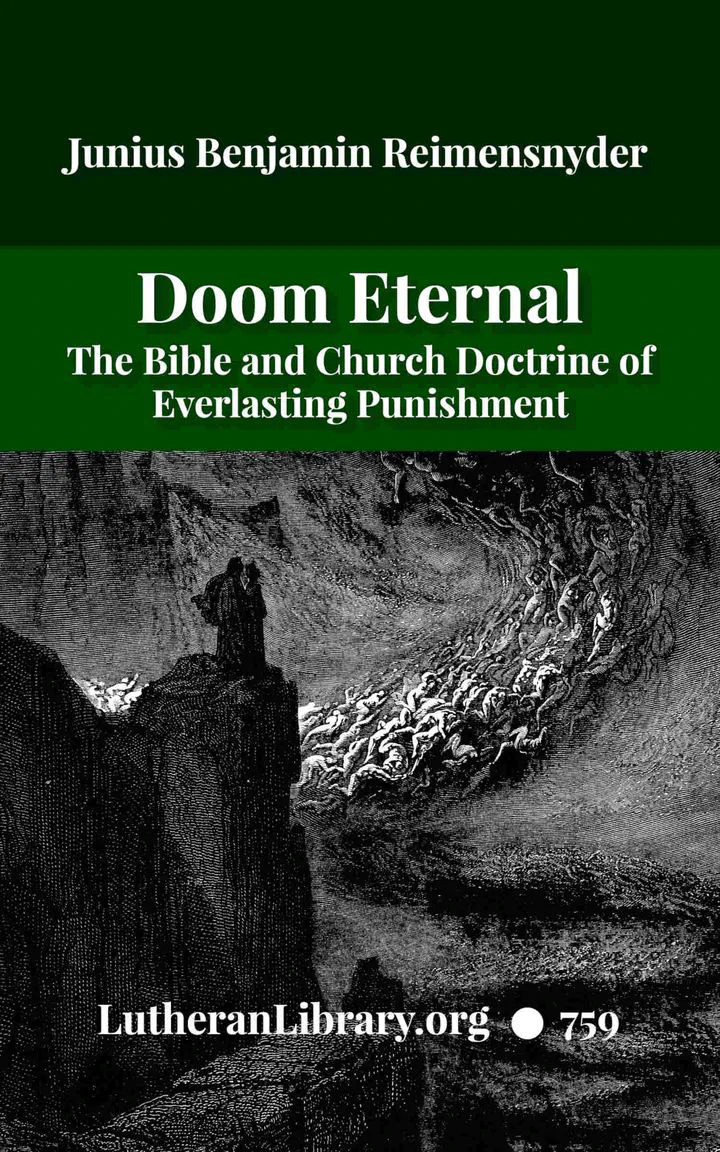Doom Eternal: The Bible and Church Doctrine of Everlasting Punishment by Junius Benjamin Remensnyder

“God is a Sovereign and a Judge as well as a Father; and there come crises when it would but be weakness in him not to be inflexible in severity. The safety of the universe throughout unceasing ages demands that God illustrate everlasting justice upon sinners, as well as that. he exhibit infinite love. There is a moral law, a system of rewards and retributions, which has its terrestrial expression in human governments; and as the safety of society here depends upon the firmness of its administration, so is it throughout immensity and eternity. The archangel Michael, in the famous painting of Guido, crushing the dragon under his feet, and standing puissant in triumph as the unwavering Vindicator of right, and the unflinching avenger of wrong, is a sublime-symbol of this immutable law. This scene fitly represents the “backbone of the moral universe.” And to deny this truth, and to seek to View God in the aspect of love alone, is to ignore the most patent facts everywhere circumventing us.
Level of Difficulty: Intermediate: Some subject matter knowledge helpful.
Book Contents
Preface.
Introduction By Charles Porterfield Krauth.
Letter From Theodore D. Woolsey, Ex-President Of Yale College.
Part One. The Witness Of The Church.
- 1 Articles Or Faith Universally Held Are Fundamental.
- 2 Church Historians And Students Of Christian Antiquities.
- 3 The Apostolical Fathers.
- 4 The Ante-Nicene Fathers.
- 5 The Clementine Homilies And Recognitions, Apostolical Constitutions, And Apocryphal Gospels.
Section I. — The Clementine Homilies.
Section II. — The Clementine Recognitions.
Section III. — The Apostolical Constitutions.
Section IV. — Apocryphal Gospels, Acts, and Revelations.
- 6 The Individual Creeds.
- 7 The OEcumenical Or General Creeds.
- 8 The Particular Creeds.
- 9 Universal Consent Established — Not An Open Question.
Part Two. The Teaching Of Scripture.
Section One. Individual Words In The New Testament Teaching Eternal Punishment.
- 1 The Usage Of αἰὼν, αἰὡνιος By The Greek Classic Writers.
- 2 The Usage Of αἰὼν, αἰὡνιος By The Greek Speaking Jews.
- 3 The Usage Of αἰὼν, αἰὡνιος In The New Testament.
- 4 Αἰὼν
- 5 Αἰὡνιος
- 6 The Usage Of αἰὼν and αἰὡνιος By Our Lord Himself.
- 7 The Usage Of αἰὼν, αἰὡνιος By The Primative Christians.
- 8 Αἰὼν, αἰὡνιος As Defined By Eminent Lexicographers.
- 9 Objections Considered — The Figurative Use Of αἰὼν, αἰὡνιος .
- 10 Opinions Of The Jews At The Time Of Christ; The Talmud.
- 11 Other Scriptural Words Teaching The Eternal Duration Of Future Punishment.
Section Two. General Statements Of Scripture In Which The Eternity Of Future Punishment Is Either Expressly Taught Or Necessarily Implied.
- 1 Life The Only Stage Of Probation.
- 2 Unpardonable Sins.
- 3 Finality Of The Future State.
- 4 The Apocalypse.
- 5 The Last Judgment.
- 6 The Scriptural Doctrine Of Hell.
- 1 The Nature Of The Punishments Of Hell.
- 2 Is Hell Fire A Material One?
- 3 Are Hell Punishments Without Distinction In Kind Or Degree?
- 4 The Punishments Of Hell Endless.
- 7 Purgatory.
- 8 Annihilation.
- 9 The Apocatastasis, On Restitution On All Things.
Part Three. The Voice Of Reason.
- 1 Reason And Revelation.
- 2 Natural Religion Affirms Eternal Punishment.
- 3 Divine Justice No Less Infinite Than Divine Love.
- 4 Eternity The Contrast Of Time.
- 5 Inviolability Of The Will.
- 6 The Guilt Of Sin Incalculable.
- 7 Inveteracy Of Evil.
- 8 Universality Of Law.
- 9 Eternal Retributions Necessary As Motives.
Part Four. Fallacies And Evils Of Restorationism Or Universalism.
- 1 Emotional And Vituperative Style.
- 2 Perversion Of Historical Facts.
- Luther On Eternal Punishment.
- 3 Latent Skepticism.
- 4 The Practical Outcome, Universalism.
- 5 Marring Of Christ’s Redemptive Glory.
- 6 Encouragement To Postpone Repentance.
- 7 Shall We Abandon The Old Gospel?
- 8 “Pale Negations.”
- 9 Conclusion
Copyright Notice
Publication Information
- Lutheran Library edition first published: 2021
- Copyright: CC BY 4.0